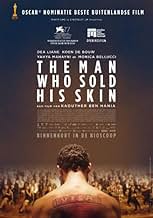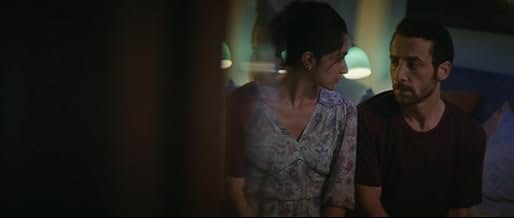The Man Who Sold His Skin
- 2020
- 1 घं 44 मि
IMDb रेटिंग
6.9/10
7.5 हज़ार
आपकी रेटिंग
अपनी भाषा में प्लॉट जोड़ेंHis own body turned into a living work of art and promptly exhibited in a museum, Sam, a Syrian refugee, will soon realize to have sold away more than just his skin.His own body turned into a living work of art and promptly exhibited in a museum, Sam, a Syrian refugee, will soon realize to have sold away more than just his skin.His own body turned into a living work of art and promptly exhibited in a museum, Sam, a Syrian refugee, will soon realize to have sold away more than just his skin.
- 1 ऑस्कर के लिए नामांकित
- 9 जीत और कुल 12 नामांकन
Koen De Bouw
- Jeffrey Godefroi
- (as Koen de Bouw)
फ़ीचर्ड समीक्षाएं
A desperate man on the run from Syria, sells his back as a canvas for an eccentric artist. He sits as a display for audiences at galleries and museums. His girlfriend Has moved to Belgium with her new husband. He is well paid but has doubts about his choice. The story uses a real life situation where a man sold his skin to an artist. The movie was nominated for an Oscar and I rank it just below A Better Life in the foreign film category.
The opening scene shows a framed item being hung in a stark white exhibition space. We're then greeted to the sound of purring cat as a man stirs awake. This is, for the most part, the nearest we get to a happy scene: 'The man who sold his skin' is an excellent film, but it's not a particularly pleasant story being told.
There is an unyielding tension pervading the feature that comes from the mere knowledge of the premise, let alone seeing the narrative play out. Passing moments of levity, and the quality of the film-making craft on display, help to offset that feeling, and an accompanying melancholy, but don't truly make this easier to watch.
Yet make no mistake, 'The man who sold his skin' is a fine film, very well made. Writer-director Kaouther Ben Hania's camerawork is exquisite, with many eye-catching shots as worthy of appreciation as any piece of art in a museum. There are several instances where lens flare, or the refraction of light through glass, is used to partly obscure a shot with an artistic touch that I think often gets lost in many pictures employing the same tricks. Then, too, the music of composer Amine Bouhafa catches our attention to, perfectly complementing the scenes we see.
And the cast is outstanding. The only actor here I distinctly recognize is Monica Bellucci, whose presence is surprising but welcome, as she brings an entrancing, understated intensity to her role. I could swear I've seen Koen De Bouw in other features, though a glance at his credits suggests otherwise. Still, there's a purposefulness, and cunning, in his countenance that we can't tear our eyes away from. Above all, though, I would love to learn more about Dea Liane, and star Yahya Mahayni, whose lack of renown belies great skill. It's a joy to see them at play, and I'd love to watch more of their features.
Engrossing as Ben Hania's screenplay is, the narrative is a thinly veiled vehicle for stark themes of human rights, racism, exploitation, dehumanization, and the tricks we fool ourselves into believing in pursuit of a better life. There are some especially ugly and cringe-worthy moments on display as these notions are laid as bare as the skin on protagonist Sam Ali's back. Once more - it's undeniably captivating, but viewers looking for an uplifting flick may wish to look elsewhere.
Still, when all is said and done, the ending is a little bit shocking, yet also deeply rewarding. It's a fine capstone to a film that has explored some very murky territory, and further credit to the writing.
There's no question in my mind that 'The man who sold his skin' is well deserving of every accolade to come its way. It can be a difficult movie to watch at times, but it's so well made that it's a journey very much worth taking, and finding to watch wherever you can.
There is an unyielding tension pervading the feature that comes from the mere knowledge of the premise, let alone seeing the narrative play out. Passing moments of levity, and the quality of the film-making craft on display, help to offset that feeling, and an accompanying melancholy, but don't truly make this easier to watch.
Yet make no mistake, 'The man who sold his skin' is a fine film, very well made. Writer-director Kaouther Ben Hania's camerawork is exquisite, with many eye-catching shots as worthy of appreciation as any piece of art in a museum. There are several instances where lens flare, or the refraction of light through glass, is used to partly obscure a shot with an artistic touch that I think often gets lost in many pictures employing the same tricks. Then, too, the music of composer Amine Bouhafa catches our attention to, perfectly complementing the scenes we see.
And the cast is outstanding. The only actor here I distinctly recognize is Monica Bellucci, whose presence is surprising but welcome, as she brings an entrancing, understated intensity to her role. I could swear I've seen Koen De Bouw in other features, though a glance at his credits suggests otherwise. Still, there's a purposefulness, and cunning, in his countenance that we can't tear our eyes away from. Above all, though, I would love to learn more about Dea Liane, and star Yahya Mahayni, whose lack of renown belies great skill. It's a joy to see them at play, and I'd love to watch more of their features.
Engrossing as Ben Hania's screenplay is, the narrative is a thinly veiled vehicle for stark themes of human rights, racism, exploitation, dehumanization, and the tricks we fool ourselves into believing in pursuit of a better life. There are some especially ugly and cringe-worthy moments on display as these notions are laid as bare as the skin on protagonist Sam Ali's back. Once more - it's undeniably captivating, but viewers looking for an uplifting flick may wish to look elsewhere.
Still, when all is said and done, the ending is a little bit shocking, yet also deeply rewarding. It's a fine capstone to a film that has explored some very murky territory, and further credit to the writing.
There's no question in my mind that 'The man who sold his skin' is well deserving of every accolade to come its way. It can be a difficult movie to watch at times, but it's so well made that it's a journey very much worth taking, and finding to watch wherever you can.
I hadn't realised that was by a Tunisian director. She did a good job to get Syrians to play nearly all of the principal parts. It really irritates me when the accents don't match the supposed country when I watch an Arabic-language film and I always wonder why so many films make do with impersonations. I used to live in Syria, so it is even worse when the actors are playing (and failing) the various Syrian accents.
I was also pleased to see that there was very little propaganda against His Excellency Bashar al-Assad, the elected President of Syria. He was referred to as a dictator at one point; I wish the translation on the subtitles had said "Autarch" which might have been better. However, despite the freedoms experienced by Syrians before the attack on her, the results of the scene in the train during the marriage proposal and its subsequent sequels are wearily familiar as were the family connections used as a solution.
Life as a refugee was shown unflinchingly. I have had experience of some of the tricks and strategies used by migrants to stay alive - I live in a different Arab country now and see sub-Saharan immigrants at exhibitions where food will be served so they can get a meal for free just as Sam and his friends do in the film.
It's at one of these exhibitions that Sam's life changes. He makes a pact that will allow him to follow his love to Europe to fulfil a promise and a dream. He has contracted out his body.
Not everything goes smoothly, of course. There wouldn't have been a film if it had. That the hour and forty four minutes flew past is a testament to the power of the storyline and plot development. The last two twists in the final minutes of the film had me in the depths of despair; I'd seen the first one coming. What else would DAESH had done? There's another development after that which resolves the film completely.
I had had this waiting to be watched for a month or so. Last night was an ideal time to watch; I was relaxed and ready for it. I recommend the film.
I was also pleased to see that there was very little propaganda against His Excellency Bashar al-Assad, the elected President of Syria. He was referred to as a dictator at one point; I wish the translation on the subtitles had said "Autarch" which might have been better. However, despite the freedoms experienced by Syrians before the attack on her, the results of the scene in the train during the marriage proposal and its subsequent sequels are wearily familiar as were the family connections used as a solution.
Life as a refugee was shown unflinchingly. I have had experience of some of the tricks and strategies used by migrants to stay alive - I live in a different Arab country now and see sub-Saharan immigrants at exhibitions where food will be served so they can get a meal for free just as Sam and his friends do in the film.
It's at one of these exhibitions that Sam's life changes. He makes a pact that will allow him to follow his love to Europe to fulfil a promise and a dream. He has contracted out his body.
Not everything goes smoothly, of course. There wouldn't have been a film if it had. That the hour and forty four minutes flew past is a testament to the power of the storyline and plot development. The last two twists in the final minutes of the film had me in the depths of despair; I'd seen the first one coming. What else would DAESH had done? There's another development after that which resolves the film completely.
I had had this waiting to be watched for a month or so. Last night was an ideal time to watch; I was relaxed and ready for it. I recommend the film.
"The Man Who Sold His Skin," Tunisia's first ever International Feature Film nominee at the Academy Awards, reminded me a lot of the movie "Synonyms" from last year. Both are about men who have been exiled from their countries of origin -- in one the man is a Syrian refugee, in the other a young man self exiles himself from the oppressive military culture of Israel. In both films, the men find themselves turned into commodities by their adopted countries, welcomed only as much as they can prove themselves to be useful. I liked both films quite a lot, "Synonyms" probably a bit more, but "The Man Who Sold His Skin" is quite good in its own right.
It's apparently based on a true story, though I always take that claim with a grain of salt. The man at the film's center agrees to have his entire back tattooed with a visa that allows refugees to travel freely through Europe, which turns him into a living work of art on display in museums and galleries. The lack of narrative subtlety is compensated for by a striking visual style. This film looks beautiful, nearly every scene offering the viewer composition just begging to be admired. Indeed, at times it's almost a little too beautiful, too carefully composed, as if the director just couldn't help but make choices that would draw attention to themselves. But it's a sin I can forgive when the results are a movie that looks as good as this one does.
Grade: A.
It's apparently based on a true story, though I always take that claim with a grain of salt. The man at the film's center agrees to have his entire back tattooed with a visa that allows refugees to travel freely through Europe, which turns him into a living work of art on display in museums and galleries. The lack of narrative subtlety is compensated for by a striking visual style. This film looks beautiful, nearly every scene offering the viewer composition just begging to be admired. Indeed, at times it's almost a little too beautiful, too carefully composed, as if the director just couldn't help but make choices that would draw attention to themselves. But it's a sin I can forgive when the results are a movie that looks as good as this one does.
Grade: A.
"The Man Who Sold His Skin" depicts a refugee forced into an unpleasant predicament. In showing the plight of refugees, Kaouther Ben Hani's Academy Award-nominated movie also looks at the cold attitudes of supposedly highbrow individuals. The sad thing is that there are probably people in real life who have gotten subjected to this sort of thing. I recommend it.
क्या आपको पता है
- ट्रिवियाWhile director Kaouther Ben Hania was visiting the Louvre Museum in Paris in 2012, there was a retrospective of Belgian artist Wim Delvoye. There she saw, in Napoleon III's apartments, Delvoye's Tim (2006 - 08), in which the artist had tattooed the back of Tim Steiner, who was sitting on an armchair with his shirt off displaying Delvoye's design. The piece was sold to a German art collector and Tim is contractually obliged to spend a certain amount of time, topless and sitting still, in a gallery every year. Wim Delvoye appears in the movie as the insurance guy.
- गूफ़When Sam Ali changes his seat at the train at 05:55, the place of the man in the back seat changes each time the camera switches between Sam and Abeer.
- कनेक्शनFeatured in 93वें अकादमी पुरस्कार (2021)
- साउंडट्रैकFiliae maestae Jerusalem, RV 638: I, 'Filiae maestae Jerusalem'
Music by Antonio Vivaldi (uncredited)
Conducted and Performed by Philippe Jaroussky (Audio) (p)
Performed by Ensemble Artaserse (uncredited)
2014 Erato/Warner Classics, Warner Music UK Ltd.
टॉप पसंद
रेटिंग देने के लिए साइन-इन करें और वैयक्तिकृत सुझावों के लिए वॉचलिस्ट करें
- How long is The Man Who Sold His Skin?Alexa द्वारा संचालित
विवरण
- रिलीज़ की तारीख़
- कंट्री ऑफ़ ओरिजिन
- आधिकारिक साइटें
- भाषाएं
- इस रूप में भी जाना जाता है
- The Man Who Sold His Back
- फ़िल्माने की जगहें
- उत्पादन कंपनियां
- IMDbPro पर और कंपनी क्रेडिट देखें
बॉक्स ऑफ़िस
- बजट
- €22,30,000(अनुमानित)
- दुनिया भर में सकल
- $2,27,290
- चलने की अवधि1 घंटा 44 मिनट
- रंग
- ध्वनि मिश्रण
- पक्ष अनुपात
- 2.39 : 1
इस पेज में योगदान दें
किसी बदलाव का सुझाव दें या अनुपलब्ध कॉन्टेंट जोड़ें






























